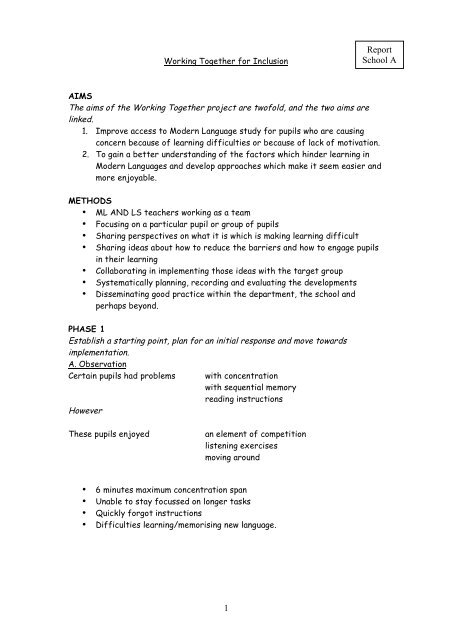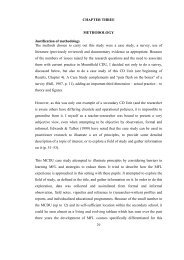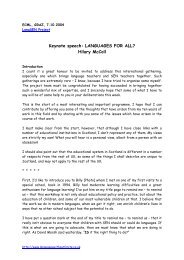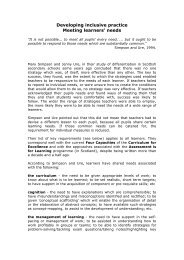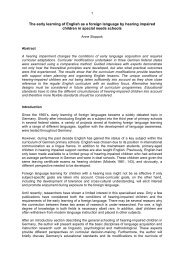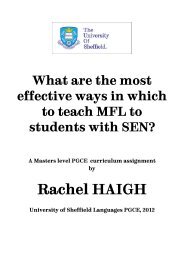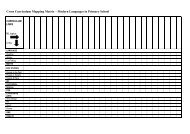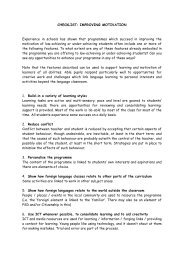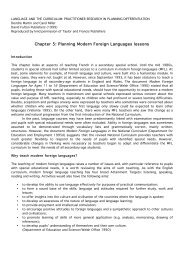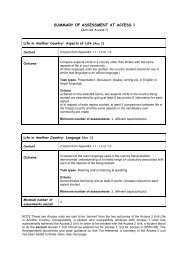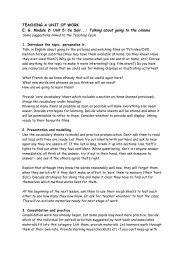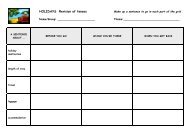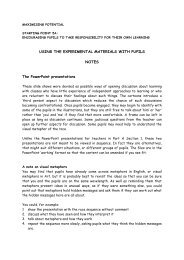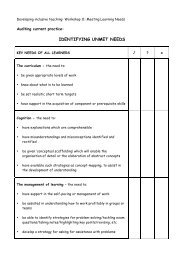Report from School A - Languages Without Limits
Report from School A - Languages Without Limits
Report from School A - Languages Without Limits
Create successful ePaper yourself
Turn your PDF publications into a flip-book with our unique Google optimized e-Paper software.
Working Together for Inclusion<br />
<strong>Report</strong><br />
<strong>School</strong> A<br />
AIMS<br />
The aims of the Working Together project are twofold, and the two aims are<br />
linked.<br />
1. Improve access to Modern Language study for pupils who are causing<br />
concern because of learning difficulties or because of lack of motivation.<br />
2. To gain a better understanding of the factors which hinder learning in<br />
Modern <strong>Languages</strong> and develop approaches which make it seem easier and<br />
more enjoyable.<br />
METHODS<br />
• ML AND LS teachers working as a team<br />
• Focusing on a particular pupil or group of pupils<br />
• Sharing perspectives on what it is which is making learning difficult<br />
• Sharing ideas about how to reduce the barriers and how to engage pupils<br />
in their learning<br />
• Collaborating in implementing those ideas with the target group<br />
• Systematically planning, recording and evaluating the developments<br />
• Disseminating good practice within the department, the school and<br />
perhaps beyond.<br />
PHASE 1<br />
Establish a starting point, plan for an initial response and move towards<br />
implementation.<br />
A. Observation<br />
Certain pupils had problems with concentration<br />
with sequential memory<br />
reading instructions<br />
However<br />
These pupils enjoyed<br />
an element of competition<br />
listening exercises<br />
moving around<br />
• 6 minutes maximum concentration span<br />
• Unable to stay focussed on longer tasks<br />
• Quickly forgot instructions<br />
• Difficulties learning/memorising new language.<br />
1
B. Analysis<br />
Planning grid – To be completed when planning for a specific group.<br />
Factors to take<br />
into account<br />
Effect on ML<br />
learning<br />
Teaching/Learning<br />
strategies<br />
Additional support<br />
requirements<br />
Our aim: Keep pupils on task and complete more work during each lesson.<br />
• Textbook not accessible to all<br />
• Way language had been taught in the past had to change<br />
• Behaviour was becoming an issue as teaching styles were not meeting the<br />
needs of all pupils<br />
PHASE 2<br />
Implementation of strategies<br />
• Evaluation of behaviour and expectations in whole class and in group work<br />
• Time management<br />
• Multi-sensory teaching styles<br />
• Explored a variety of learning styles with the pupils<br />
• Peer teaching<br />
• Pupil feedback<br />
• Pre-determined support materials provided by Learning Support teacher<br />
Strategies for whole class/ group work<br />
Critical skills technique – What makes a quality audience/group?<br />
Pupil derived rules and expectations.<br />
A grid to read before group work and then use afterwards to evaluate<br />
performance.<br />
Pupils clearly knew the expectations<br />
Consequences<br />
Group work became enjoyable for more pupils. Pupils with<br />
concentration problems were more focussed which benefited<br />
others and lessons could be more group orientated.<br />
Behaviour improved greatly. Clear rules and expectations that<br />
were shared by all. No arguing, as the rules were pupil derived.<br />
Strategies to aid the individual<br />
Short/timed tasks broken down into manageable chunks. Pupils given<br />
clear times for each activity (with some flexibility). On occasions, pupils<br />
given own list of tasks in order to tick off work as and when completed.<br />
More work completed in class<br />
Pupils stayed focussed for longer<br />
Multi-sensory teaching styles. Activities include: video of pupils talking<br />
about their favourite things, French breakfast, labelling a real skeleton,<br />
2
presenting vocabulary by using variety of methods for the same words<br />
and pupils producing illustrated vocabulary booklets.<br />
Pupils more motivated due to a desire to take part and get out of<br />
seats.<br />
Exploration of learning styles. In preparation for assessments, we<br />
discussed different learning styles and continually gave examples of good<br />
and varied learning styles throughout the term. Pupils taught how to<br />
prepare for writing and speaking through mind-mapping, memorising<br />
through pictures and effective note taking. Pupils given flexibility to<br />
experiment with their preferred learning technique.<br />
More confident pupils. In the past, many pupils gave up quickly in<br />
writing and speaking assessments. Through mind-maps and pictures,<br />
many found success in an area that they had only known failure.<br />
A realisation that not understanding something or being able to<br />
memorise something is not always due to being “thick”.<br />
Peer assessment. Pupils find grammar difficult to grasp. More able pupils<br />
were given the task of producing teaching material in order to help their<br />
peers gain a better understanding. 2 “teachers” worked with 2 pupils.<br />
Result: 1 to 1 teaching for less able. Had prizes for best teacher and<br />
most improved pupil.<br />
Motivation was unbelievable as a very mixed class worked closely as a<br />
team.<br />
Feedback by pupils resulted in teacher self-evaluation. “What did you like<br />
about the lesson?” What could have made the lesson better?” Anonymous<br />
and very honest!<br />
An immediate evaluation of how the lesson has gone.<br />
A tool that enabled the pupils to understand how others in the class<br />
felt about a particular activity or lesson.<br />
Pre-determined support material. SFL produced support material needed<br />
for specific tasks e.g. numbers sheets, time worksheets and games, a<br />
bank of laminated vocabulary banks to be used when needed and advice<br />
about materials needed in order to aid dyslexic learners when using a<br />
dictionary<br />
More independent learners. Fewer hands up as the needs of<br />
specific individuals were catered for.<br />
PHASE 3<br />
Developing inclusive approaches<br />
3 Pathways<br />
• Encourage independent learners<br />
• Personalise learning<br />
• Develop group work<br />
All interlinked – see attached<br />
3
CONCLUSION<br />
Pupil survey<br />
Beginning of project<br />
Downfalls<br />
80% - Important to be able to speak another language<br />
72% - I’d like to be able to speak French well<br />
22% - I usually enjoy French lessons<br />
• Time for making resources and meeting with SFL<br />
• Cost – photocopying and resources<br />
What the pupils gained<br />
A feeling of success in a subject that they had always found difficult<br />
Life skills<br />
The first steps into becoming independent learners<br />
A greater understanding into their own preferred learning style<br />
A more enjoyable learning environment where pupils are engaged and on<br />
task.<br />
What I have gained<br />
A feeling of achievement. Many pupils found success in a subject that<br />
they found difficult<br />
An insight into the barriers that make learning a language difficult and<br />
how these can be overcome by forward planning.<br />
Were the aims achieved?<br />
By understanding the factors that hinder Modern Language learning and by<br />
developing approaches that simplify and make lessons more enjoyable, many<br />
learning difficulties were overcome by the motivation of my pupils.<br />
4


